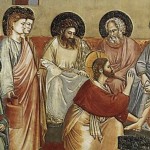Who are we inviting to Thanksgiving Dinner?
Don’t you hate it when someone spoils your fun?
That happened to me when I read the post “When you give a banquet” by Alan at “DownshoreDrift.”
Actually, I guess it wasn’t Alan who spoiled my fun, it was Jesus. Alan just happened to post this passage of Scripture:
He said also to the man who had invited him, “When you give a dinner or a banquet, do not invite your friends or your brothers or your relatives or rich neighbors, lest they also invite you in return and you be repaid. But when you give a feast, invite the poor, the crippled, the lame, the blind, and you will be blessed, because they cannot repay you. You will be repaid at the resurrection of the just.” (Luke 14:12-14 ESV)
How many of us are willing to follow Jesus’ instructions this Thanksgiving? Are you? Am I? I’ll keep you posted.
Salaam and a cookie
Two years ago, I wrote a post called “Salaam and a cookie” about an encounter that I had in a Subway restaurant. I try to strike up a conversation with people wherever I go – often to the embarrassment of my family :). Here’s the post:
————————————————–
Saturday evening, Margaret and I were returning home from an afternoon shopping trip. We had planned to buy something for dinner at the grocery store, but we realized that we forgot to do that. So, we decided to stop by a local Subway shop for $5 subs.
The man behind the counter took our order and fixed our sandwiches quickly. As we were checking out, I noticed his accent. I LOVE accents, and I love learning about people. So, I said to the man, “I don’t mean to be rude, but can I ask where you’re from?”
Apparently, he didn’t think I was being rude at all. He smiled and said, “Lebanon”.
I smiled back and said, “Salaam”, which is a generic Arabic greeting, like “hello” or “greetings”.
He smiled even bigger and we talked for few minutes about Lebanon and other Lebanese people in the area. I’ve met a few from local restaurants.
As we were about to leave, he stopped us and gave us three cookies.
It is amazing how much people will talk about themselves if you are interested and take the time to listen. I often talk to people – especially people with accents. I love languages, but I also love to hear people talk about themselves and their home countries. I’ve also found that people like to talk about themselves.
I’ve learned how to say “hello” in many different languages just by asking people where they were from. Of course, this means that I have to stop thinking about myself, and think about other people – which is hard to do. I’ve been taught (along with most people in the US) to consider myself and my own interests first. I’ve been taught to use other people to get the things that I want or that I need.
But, somehow, God has changed me. I no longer think about myself (well, not all the time). I often find myself wondering about the person behind the counter, or in line next to me, or taking my order, or next door. And, when I find myself wondering, I try to stop and ask them about themselves.
People’s demeanor (often) changes completely when you ask them about themselves. They become much more open to sharing and listening… especially when I listen first. But, this is something that is not natural for me. It is something that I’m learning, I think, through the work of the Spirit in my life.
I enjoyed sharing a cookie with Margaret on the way home. I enjoyed seeing the kids’ excitement when we gave them their cookies. But, more than that, I enjoyed learning more about the man behind the counter at Subway, and learning more about Lebanon and the Arabic language. I’m going to look for him the next time I stop at Subway.
We’re not “called out”
Recently, I’ve posted a few quotes from commentaries in which the authors say that the Greek term ekklesia (usually translated “church”) means “assembly” and not “called out ones.” Why is this important?
The idea of the church being “called out” usually leads to the conclusion that the church is called out of the world. But, this is exactly opposite of what Jesus taught. In his prayer in John 17, Jesus prays:
I do not ask that you take them out of the world, but that you keep them from the evil one. They are not of the world, just as I am not of the world. (John 17:15-16 ESV)
Jesus specifically prays that his followers (the church) remain in the world, not that they would be taken out of the world (or “called out of the world”).
Unfortunately, so many have accepted this idea that God has called his people out of the world that they then need to figure out how to get back to the world in order to carry out God’s mission.
What’s the answer? Stay in the world… stay connected to the world… maintain relationships with the world… build relationships with the world… remain in the world, even though our source of strength, power, hope, salvation, etc. is not from the world (“of the world”).
As the church, we are assembled by God in the world. We are not called out of the world; we are called into the world.
Can you imagine the impact…
I’ve been outside the United States a few times. Twice, I went specifically to serve people in the name of Jesus – once to Nicaragua and once to Ethiopia. In each instance, the time spent serving people from another country/culture changed me as much as it changed the people there. In many ways, during those times, I was forced to take my thoughts off of myself and my “things,” and put those thoughts towards other people.
Now, Dave Black (November 11, 2010 at 7:26 a.m.) has written an exhortation that I cannot ignore. I hope, as you read it, that you cannot ignore it either. We must ask ourselves what we’re doing… really doing… in the name of Jesus, and what we’re doing in our own name. Are we completely giving of ourselves, or are we holding part back so that we can maintain our stuff?
Here is the quote:
I had been hearing about missionaries all of my life. And now I’m the GIF, the Guy In Africa, that eccentric person who can’t feel comfortable among opulence any more, who stays up half the night thinking about a sick child in Alaba or a suffering woman in Burji or a persecuted evangelist in Gondar. I don’t ever want to lose this feeling, this marveling at the world, this attraction to a country called Black-Faced (Ethiopia) filled with outcasts and dying people and babies suffering from malaria and women needing fistula surgery, this nation of 80 million people worshiping their trees or their saints or their false gods. I never want to forget how incredibly small you feel when you’re trying to bring medical supplies through customs or watching the heart-wrenching poverty or scooping up a half-naked infant or standing next to the graves of missionaries from past generations who went out to the field and never came back home (or was it ever “home” for them again?). Can you imagine what would happen if Christians in America were to grasp the principle of sharing what they have to meet the needs of the Gospel around the world? Can you imagine what the impact would be if we stopped spending 95 percent of our church budgets on ourselves? Can you imagine the change it would make if we lived a lifestyle that matched our responsibility to a lost and dying world? Seven years ago my lifestyle was up from grabs. Every thought and every action was tested by the simple teachings of Scripture. I decided, along with Becky, that I would lay up no treasure for myself on this earth. Suddenly I was free — free from my bondage to material things, free to allow God to use me — a nobody — to be His hands and feet and arms in Africa.
I can imagine the impact. I can imagine the change. I’ve seen a small sample personally, and I’ve read about it in the New Testament.
The question is… now that we can imagine it… are we willing to live it? What is preventing us (me and you) from living it?
Gospel or Social Justice?
Two recent posts have suggested that our proclamation of the gospel must proceed along with social justice – that is, caring for people’s needs. Otherwise, the authors agree, we are not truly proclaiming the gospel.
The first post is from Arthur at “The Voice of One Crying Out in Suburbia” and is called “It cannot be one or the other, it must be both.” He says:
The problem is not an overemphasis on one or the other, it is that often the emphasis is on neither and it must be on both. The way we ensure that we don’t forget evangelism or mercy is to first, as Carson says, make sure we get the Gospel right. Second, equip all believers and give them the ability and encourage the inclination to do ministry in the world, to think outside of the church building for ministry opportunities. Third, be bold and clear that the life of a disciple of Christ is not one of insulated middle-class values and comforts but instead a self-denying, cross bearing life that will rub the world the wrong way.
The second post, which is like the first, is from Jared at “The Gospel-Driven Church” and is called “Why Social Justice is Necessary.” Jared gives us 8 reasons for including acts of mercy with gospel proclamation.
hmmm… the second is like the first… seems I’ve heard that before…
And one of them, a lawyer, asked him a question to test him. “Teacher, which is the great commandment in the Law?” And he said to him, “You shall love the Lord your God with all your heart and with all your soul and with all your mind. This is the great and first commandment. And a second is like it: You shall love your neighbor as yourself. On these two commandments depend all the Law and the Prophets.” (Matthew 22:35-40 ESV)
Oh yeah, I remember that now.
Talk is cheap. Blogging is even cheaper.
The title of this post is how Arthur at “The Voice of One Crying out in Suburbia” began his post “Time to get off the bench.” In the post, Arthur explains that he has decided to go to Haiti in January. He says:
After talking with my wife and the folks at the Haiti Orphan Project, I have decided to accompany their team to Haiti in January right around the anniversary of the devastating earthquake that left an already troubled nation utterly devastated. Time to get off the bench and get into Kingdom work… In speaking with my family, I see this as something that we as a family are looking at being involved in. Dave Black has said before that he regrets waiting so long to get into Kingdom work and I am taking his admonition to heart for me and for my family.
This is so exciting! I know that God will use Arthur to serve some orphans in Haiti, but I also know that God can use this trip to change Arthur and his family. I’m looking forward to what happens during and after Arthur’s trip.
By the way, I realize more and more that the more someone follows Christ, the more they will serve other people.
More on serving people
As I’ve said before, one of my favorite bloggers (and storytellers) is “Strider” from “Tales from Middle Earth.” His latest post, “On Finding Water,” goes along well with my previous post “They don’t want cake.” In fact, I was excited to read Strider’s post while I was working on my post a few days ago.
Here’s an excerpt from Strider’s post:
Of course, we love doing humanitarian work. Jesus has called us to love people and in loving them we find that they need two things: a relationship with Him and a standard of living that will enable them to survive. We live in a very poor Country that needs multitudes of things. I hope we choose the things we do by listening to and obeying the Holy Spirit.
In order to hear His voice we pay attention to several things. One, we help people with some of their deepest felt needs. People may need sanitation but if they don’t know this then there is no sense in providing it. We go to a community and asked them what they need rather than provide for them what is convenient for us to do. In following this line we have been asked repeatedly for fresh drinking water. Many people- possibly several hundred villages- need clean drinking water and are suffering greatly with water borne illnesses as a result of not having access to any. Two, we need a project that gives us sustained access. Many teams have come in and dropped off a load of much needed aid, prayed a quick prayer, and then moved on. This is somewhat helpful… sometimes, but a viable church is not likely to result from this. Too often people do aid work which makes them feel better and successful and humanitarian and even spiritual but if we measure success by lives impacted then these kinds of fly by night projects don’t add up to much. We need relationship. So, digging multiple wells in villages has been very good for us. We have spent all summer in a remote village in the south, going down, spending the night, serving and being served. It has provided good ground for great conversation and the opportunity to share much love.
I’ve learned that people know whether or not you truly love them and want to serve them, or if you are just doing something to make yourself feel better.
What keeps us from having a kingdom mindset?
Great points to ponder from Dave Black this morning (Monday, September 13, 2010 at 7:57 a.m.):
Last night Ronnie asked me a very important question. “What is it that keeps us from having a kingdom mindset?” We talked about the distractions of TV, football season, pleasure, comfort. I added into the mix: the church. As long as we continue to tithe to ourselves, as long as we overlook the fact that the gathering must always lead to the going, as long as we prioritize our programs and our successful ministries over making a tangible difference in the world for Christ we will never have a kingdom mindset. The greatest problem that most churches face today is not that they aren’t doing anything. They do plenty. The problem is that they’re not doing the right thing (Phil. 1:27), preferring soft cushions over Bibles in India. And the greatest danger most pastors face is not that they aren’t doing anything. They’re far too busy! It’s that they don’t do the essential things. Their purpose is to equip God’s people for works of service. The clear command of our Lord is to go to the world.
I think it’s vitally important that we stop playing the “Look how great my church is” game. I know, because I often play it myself. Oh, what a high view of the church we must have! But we must never view church as an end in itself: she is a means to an end!
The church is a means to an end. What end? The mission of God. And, as long as we focus on ourselves, we will not be accomplishing God’s mission.
Talking with Muslims
Once again, Dave Black has spelled out what should be common sense (or at least spiritual sense) for any Christian. He lists some thoughts about talking with Muslims from his experience (Friday, September 10, 2010 at 7:41 a.m.):
protect their dignity
affirm their value as persons
let your actions speak as loud as your words
become a friend
recognize that some will reject you
look for opportunities to serve them
allow them to serve you
ask questions
be slow to speak
become aware of religious barriers
introduce them to your family
refuse to argue
be sensitive to signs of receptivity
plead with God for their salvation
love, love, love
This seems to be a good way of speaking with and treating anyone… even Muslims.
The Apostles Were Apostles
Yeah, the title of this post sounds strange. But, there’s a reason to my madness.
There is alot of confusion today about apostles. In fact, this confusion has continued for thousands of years (well, about two thousand years). It’s not that I’ve figured out something that no one else has ever figured out. Many people understand the difference between apostles and apostles. But, there are many who are still confused.
You see, it all began with the apostles… the twelve… those twelve men that Jesus originally called so that he could send them out.You can see this in Matthew 9-10:
And Jesus went throughout all the cities and villages, teaching in their synagogues and proclaiming the gospel of the kingdom and healing every disease and every affliction. When he saw the crowds, he had compassion for them, because they were harassed and helpless, like sheep without a shepherd. Then he said to his disciples, “The harvest is plentiful, but the laborers are few; therefore pray earnestly to the Lord of the harvest to send out laborers into his harvest.” And he called to him his twelve disciples and gave them authority over unclean spirits, to cast them out, and to heal every disease and every affliction. The names of the twelve apostles are these… These twelve Jesus sent out… (Matthew 9:35-10:5)
The word “apostle” simply indicates that the person is a representative of someone else sent out for some person. Often, it can be translated as “messenger.” An “apostle” is differentiated from other in that the apostle is “sent out.” In fact, the noun “apostle” comes from a verb that means “to send,” as in Matthew 10:5.
Thus, the Twelve (the Apostles) were apostles. They were “sent out” by Jesus both before and after his death and resurrection. They were specifically told to make disciples of all the nations (indicating being sent) (Matthew 28:19-20) and that they were to be witnesses of Jesus to the end of the earth (also indicating being sent) (Acts 1:8).
So, the apostles (the Twelve) were apostles (those who are sent out).
The difficulty comes in recognizing that others in Scripture are also called apostles even though they were not part of the Twelve. The designations are not the same. The Twelve (including Paul?) were a special type of apostle who had been personally commissioned by Jesus. However, there were other apostles in Scripture who were not part of the Twelve.
In Acts 14:14, Barnabas is called an apostle. In 1 Thessalonians 2:6, Paul indicates that Timothy and Silas are apostles (see 1 Thessalonians 1:1 for the identification of “we”). 1 Corinthians 4:9 indicates that Apollos was an apostle (see 1 Corinthians 4:6).
Finally, in 1 Corinthians 15:3-8, Paul makes a clear distinction between “the twelve” and “the apostles.”
Thus, the Twelve (and Paul) were apostles, but others were apostles as well. There is, then, no reason not to identify Andronicus and Junia as being “among the apostles” in Romans 16:7. The indication only means that Andronicus and Junia were “sent out” away from their home in order to proclaim the gospel and strengthen the churches as they went.
The apostles were apostles, but there were other apostles who were not counted among the Twelve. From the very early days after the death of the Twelve, Christians have argued about the continuing existence of apostles. The Twelve no longer exist. But, there is no reason to assume that there are no apostles today. In fact, Scripture seems to indicate that the church continues to need apostles just as we continue to need all gifted believers.










